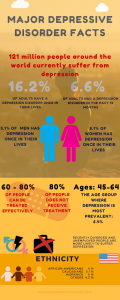Diagnosing depression according to the DSM-IV
Recognizing depression symptoms in yourself or someone else is not enough for diagnosing depression. Psychiatrists and psychologists often use internationally established criteria for diagnosing depression, such as major depressive episode. By adhering to this classification system patients diagnosing depression is more accurate and more specific research can be done which leads to better treatment recommendations. The DSM IV is such a classification system and stands for Diagnostic and Statistical Manual of Mental Disorders. The IV indicates that it is the fourth edition.
Note: to make this part easier to digest we chose to replace “Major depressive episode” for the word “depression”.
For more information:
- Depression symptoms.
- Depression causes.
- Treating depression.
- Depression types.
- Coping with depression.
- Interesting facts about depression.
- Online counselor.
- Take me to the homepage.
At Barends Psychology Practice, we treat various types of depression. Interested? Make an appointment for a first, free of charge, session now! Go to contact us. (Depending on your health insurance, sometimes treatment can be reimbursed).
The criteria for diagnosing depression (major depressive episode) according to DMS-IV:
A. According to the DSM-IV criteria one or two of the following symptoms must be present for diagnosing depression:
- Depressed mood most of the day, nearly every day by either subjective report (e.g., feelings of sadness or emptiness) or observation made by others (e.g., appears fearful).
- Significantly diminished interest or feeling no pleasure in (almost) all activities most of the day, nearly every day (as indicated by either subjective account or observation made by others).
These two criteria are not caused by a physical disorder, delusions or hallucinations. One or two of the above mentioned symptoms must be accompanied by at least four of the following symptoms:
- Significant weight reduction when not dieting or weight gain (e.g., losing/gaining more than 5% of your body weight in one month), or decreased or increased appetite nearly every day.
- Insomnia (sleeplessness) or hypersomnia (excessive sleep and sleepiness) nearly every day.
- Psychomotor agitation or retardation nearly every day (observable by others).
- Fatigue or loss of energy nearly every day.
- Feelings of worthlessness or excessive or inappropriate guilt nearly every day.
- Diminished ability to think or concentrate, or indecisiveness, nearly every day (either by subjective account or as observed by others).
- Recurrent thoughts of death (not just fear of dying), recurrent suicidal ideation without a specific plan, or a suicide attempt or a specific plan for committing suicide.
(Advertisement. For more information, please scroll down.)
B. The symptoms do not meet the criteria for a Mixed Episode.
C. The symptoms cause clinically significant distress or impairment in social, occupational, or other important areas of functioning.
D. The symptoms are not due to the direct physiological effects of a substance (e.g., a drug of abuse, a medication) or a general medical condition (e.g., hypothyroidism).
(Advertisement. For more information, please scroll down.)
E. The symptoms are not better accounted for by Bereavement, i.e., after the loss of a loved one, the symptoms persist for longer than two months or are characterized by marked functional impairment, morbid preoccupation with worthlessness, suicidal ideation, psychotic symptoms, or psycho-motor retardation.
For more information:
- Depression symptoms.
- Depression causes.
- Treating depression.
- Depression types.
- Coping with depression.
- Interesting facts about depression.
- Online counselor.
- Take me to the homepage.

